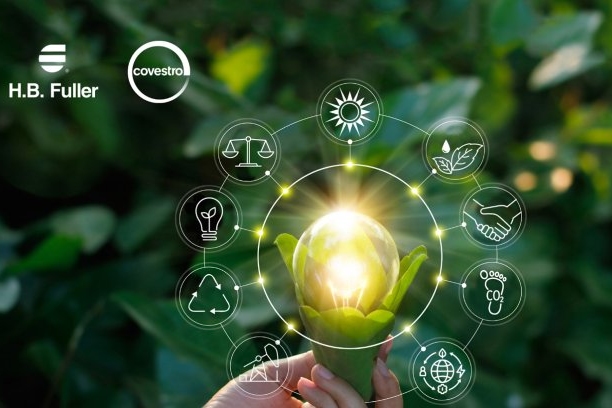

H.B. Fuller and Covestro
H.B. Fuller, a global adhesives provider, has established a strategic partnership with Covestro, one of the world’s leading polymer suppliers, to develop an adhesive with a reduced climate impact for the woodworking, composites, textiles, nonwovens, and automotive sectors industries.
The new bio-attributed raw material utilized in H.B. Fuller’s adhesive was produced using a mass balancing technique and will replace a portion of prior fossil raw materials. Renewable raw materials are utilized as feedstock at the start of the value chain and are processed in the same manufacturing units as fossil-based components. The end-product is then given the feature of the renewable feedstock process.
Covestro guarantees the use of an equivalent volume of the alternative feedstock through a third-party validated certification process. Covestro intends to replace fossil fuels and make its value chains more sustainable by progressively transitioning its manufacturing to alternative raw materials and working with dependable partners who, in turn, interact with numerous approved suppliers.
H.B. Fuller may employ the new drop-in solution in its existing manufacturing processes right away, with no technological changes required. Its clients’ facilities don’t need to make any changes, either. The quality of the items is not inferior to that of their traditional equivalents, but the reduced associated CO2 footprint makes them more sustainable.
In reality, the firm has taken steps to ensure that the goods and operations of its clients are not jeopardized in any manner. The reactive hot-melt adhesive’s reformulation has no effect on its performance or on its customers’ production, and it may be used in the same way as the product it replaces.
Dr. Thorsten Dreier, Head of Coatings and Adhesives at Covestro, said that they’re pleased to serve H.B. Fuller as their first client for adhesive applications with a mass-balanced product. By increasing the use of alternative raw materials, they want to become less reliant on petrochemical feedstocks and help to reduce CO2 emissions. Alternative raw materials are part of a broader strategy to collaborate with their partners to accelerate the transition to a circular economy and, eventually, to become totally circular themselves.
Yiqi Yang has developed a groundbreaking fiber-to-fiber recycling technology that removes dyes, separates blended fibers, and recovers high-quality materials.
DS Smith has unveiled a plastic-free packaging solution for BMW's car wheel carriers, replacing traditional materials with recyclable corrugated cardboard.
A doctoral thesis from the University of Borås, Sweden, presents a novel method for healing large bone defects using bioplastic…
Ambercycle and Highsun Holding Group have signed a strategic cooperation agreement aimed at advancing textile-to-textile (T2T) closed-loop recycling systems.
PAIGE has partnered with the Cotton Lives On programme to launch a recycling campaign, encouraging customers to bring in old…
Toray Industries Inc. from Japan, has partnered with Head Sports GmbH to create the Boom Raw tennis racquet, a product…